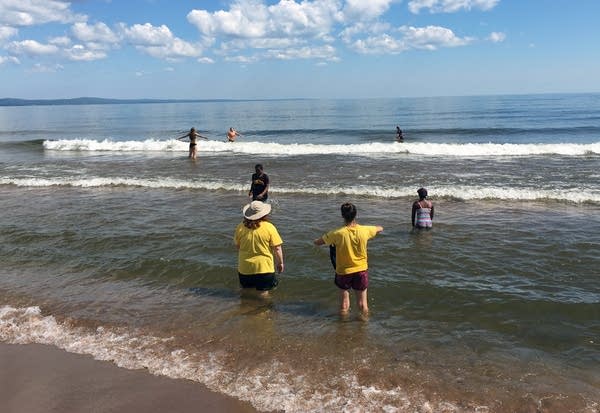Superior is no longer the clearest of the Great Lakes

Go Deeper.
Create an account or log in to save stories.
Like this?
Thanks for liking this story! We have added it to a list of your favorite stories.
Many people who've spent much time around the Great Lakes take for granted that Lake Superior is the largest, coldest and clearest of the lakes.
Not anymore.
While Lake Superior has not gotten any dirtier, lakes Huron and Michigan have gotten significantly clearer in the past 20 years or so, a study published earlier this year in the Journal of Great Lakes Research found.
Anecdotally, scientists knew water clarity was improving in those lakes. But it hadn't been quantified.
Turn Up Your Support
MPR News helps you turn down the noise and build shared understanding. Turn up your support for this public resource and keep trusted journalism accessible to all.
"What surprised us was the magnitude of the change," said Robert Shuchman, a study co-author and co-director of the Michigan Tech Research Institute. "We had no idea the data was going to tell us that Huron and Michigan have surpassed the water clarity in Lake Superior. That was the startling piece."
Scientists analyzed satellite images of the lakes captured between 1998 and 2012. Over that period, they found, the depth that light could penetrate down into the water — known as the photic zone — increased by about 20 percent in lakes Michigan and Huron.
They attribute part of that change to less phosphorous runoff. Climate change also likely plays a role. But the dominant factor is the explosion of invasive zebra and quagga mussels in the lakes since the late 1990s, researchers concluded.
Some of the highest abundances of quagga mussels in the world are found in Lake Michigan, said Gary Fahnenstiel, a senior research scientist at Michigan Tech and study co-author.

"So in a somewhat figurative sense, you can almost walk on a bed of mussels from one side of Lake Michigan to the other," he said.
Those mussels can filter the entire volume of water in Lake Michigan in only six days, Fahnenstiel said, citing current estimates.
They do that by gobbling up the plankton in the water, which are the dominant light absorbers.
Remove plankton, and the water gets a lot clearer.
"Lake Michigan now reminds me of the Caribbean," Shuchman said, with crystal clear, aqua blue water and white sand beaches along its eastern shore.
But it's critical to think about the ramifications of that clarity, Shuchman stressed.
The plankton that mussels filter also form the base of the food chain. If it's gone, the rest of the chain risks starvation. "It's very disconcerting," Shuchman said. "Because if you take it to the limit, the Great Lakes may be totally clear and you're kayaking, and you're seeing the bottom, but they may end up being literally ecological deserts."
The clearer water has also led to a surge in the growth of an algae called cladophora. Big storms then churn up the algae, which drifts to shore in stinky mats or settles to the bottom of the lake and rots.
"You see the places where it collects on the lake bottom, these vast graveyards of decomposing algae," said National Park Service aquatic ecologist Brenda Lafrancois, who often dives near Sleeping Bear Dunes National Lakeshore on Lake Michigan.
That algae is a hotspot for the growth of a harmful bacteria that in turn produces a botulism toxin that has killed large numbers of fish and birds, including migrating loons.

Lafrancois, who's based at the Apostles Islands National Lakeshore on Lake Superior, said even though Lake Superior as a whole is still pristine, there are also indications that nearshore water quality in Lake Superior is deteriorating.
An analysis of satellite maps shows a declining trend in water quality in the western Apostles since the mid-2000s, she said, due largely to rivers like the St. Louis and Brule washing huge loads of sediment into the lake during big rainstorms.
She suspects larger rain events, which are forecast to increase in a warming climate, are likely driving the trend.
But there may be a bit of good news. The number of invasive mussels may have peaked in Lake Michigan, said scientist Gary Fahnenstiel. "If I was a betting man," he said, "I'd think Lake Superior would go back to being clearer than Lake Michigan in 15-20 years."
And he believes the intense clarity of Lake Michigan, especially, may help more people recognize the beauty of the Great Lakes, and take more pride in caring for them, "and hopefully some better stewardship of the resource," he said.
Outside Duluth on a rocky stretch of Lake Superior shoreline called Brighton Beach one recent day, 70-year-old Rob Hall was throwing sticks to his yellow lab Liesel.
Asked what he thinks about Lake Superior losing its crown as the clearest of the Great Lakes, Hall said he knows firsthand just how clear the lake is. Hall, a retired firefighter, is a scuba diver who's done about 500 dives in the big lake.
"I drink it, I swim in it, I eat the fish that come out of it."
And when told about Superior being surpassed in clarity by Michigan and Huron, his opinion of his favorite lake wasn't swayed.
"No, it's still the best," he said. "They call it Superior for a reason."


